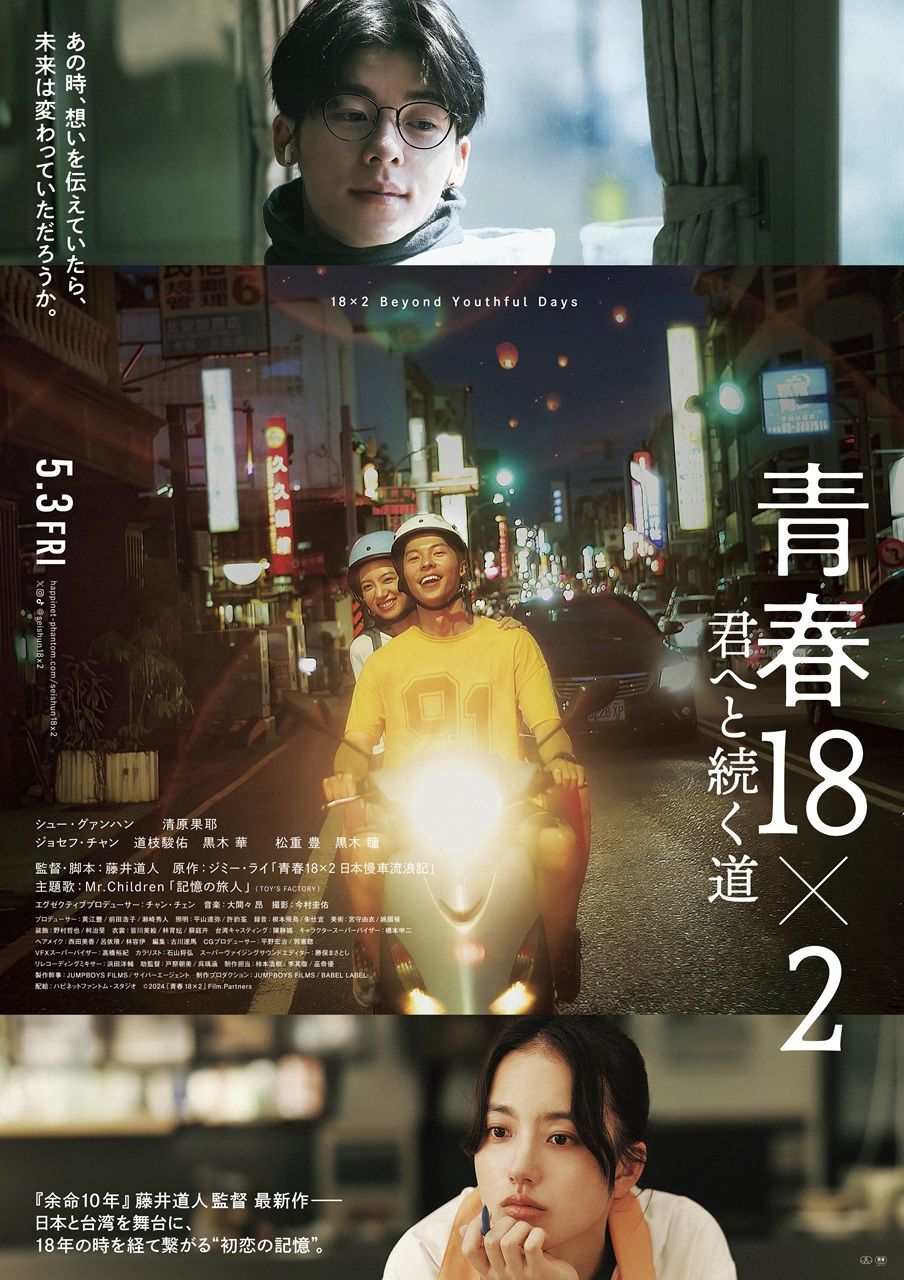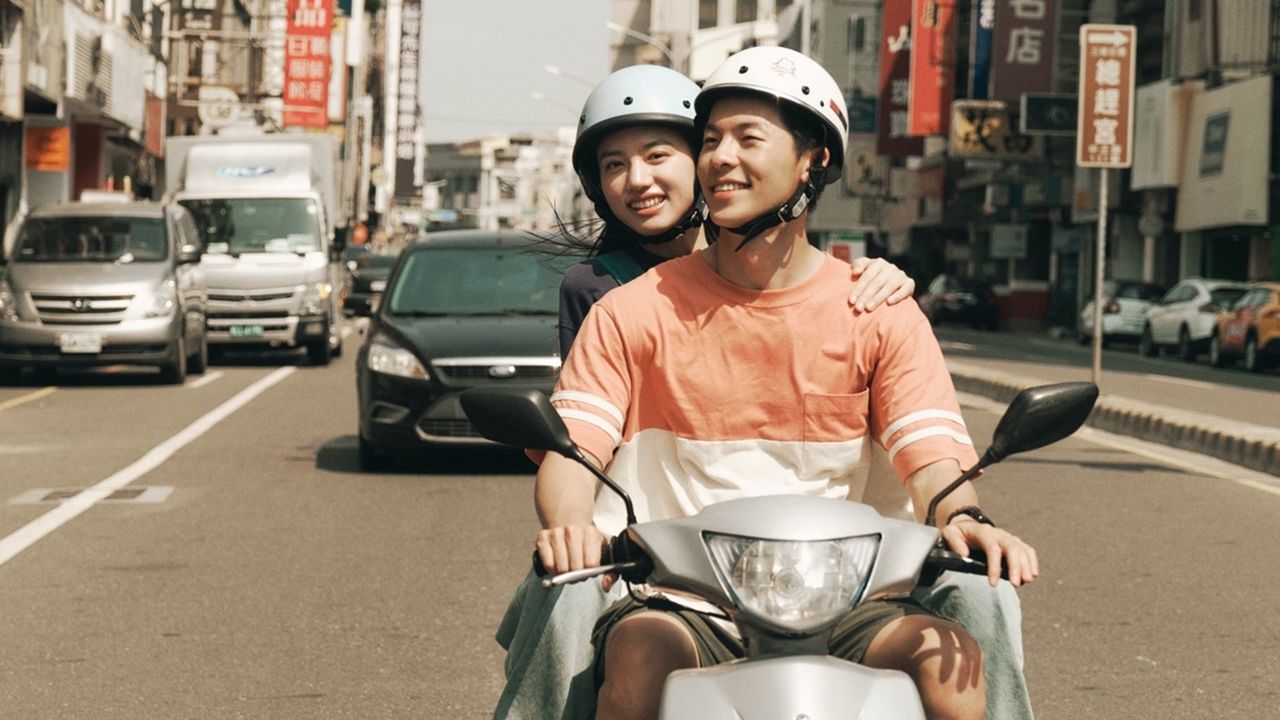
“18×2 Beyond Youthful Days” Bridges the Cinemas of Japan and Taiwan
Cinema- English
- 日本語
- 简体字
- 繁體字
- Français
- Español
- العربية
- Русский
Japan in 2024, Taiwan in 2006
Any critical writing on the cinema of various nations and regions often includes expressions like “a typical Hollywood spectacle” or “reminiscent of French cinema.” I myself am guilty of using them in my own writing.
But what would evoke “the cinema of Japan” or “films of Taiwan?” That is the question I pondered after watching 18×2 Beyond Youthful Days.
The story starts in Taiwan in 2024. The 36-year-old Jimmy, who ran a game company with a university classmate, has been removed from the top by a vote of his firm’s board and returns to his childhood home in Tainan. When he gets there, he finds a postcard from Ami (Kiyohara Kaya), a Japanese backpacker he met while working part time at a karaoke shop when he was 18. The broke backpacker, four years his senior, had been staying at the shop while working there as well, and young Jimmy had fallen for her.
Soon after his firing, Jimmy is asked to go to Japan to perform one last job for the company, and when the task is done, he sets out on a journey through the country by slow train. He wanders from Tokyo to Kamakura, through Nagano and Niigata, and finally to Fukushima. As he moves from one local encounter to another, he looks back on memories of Ami, his first love.
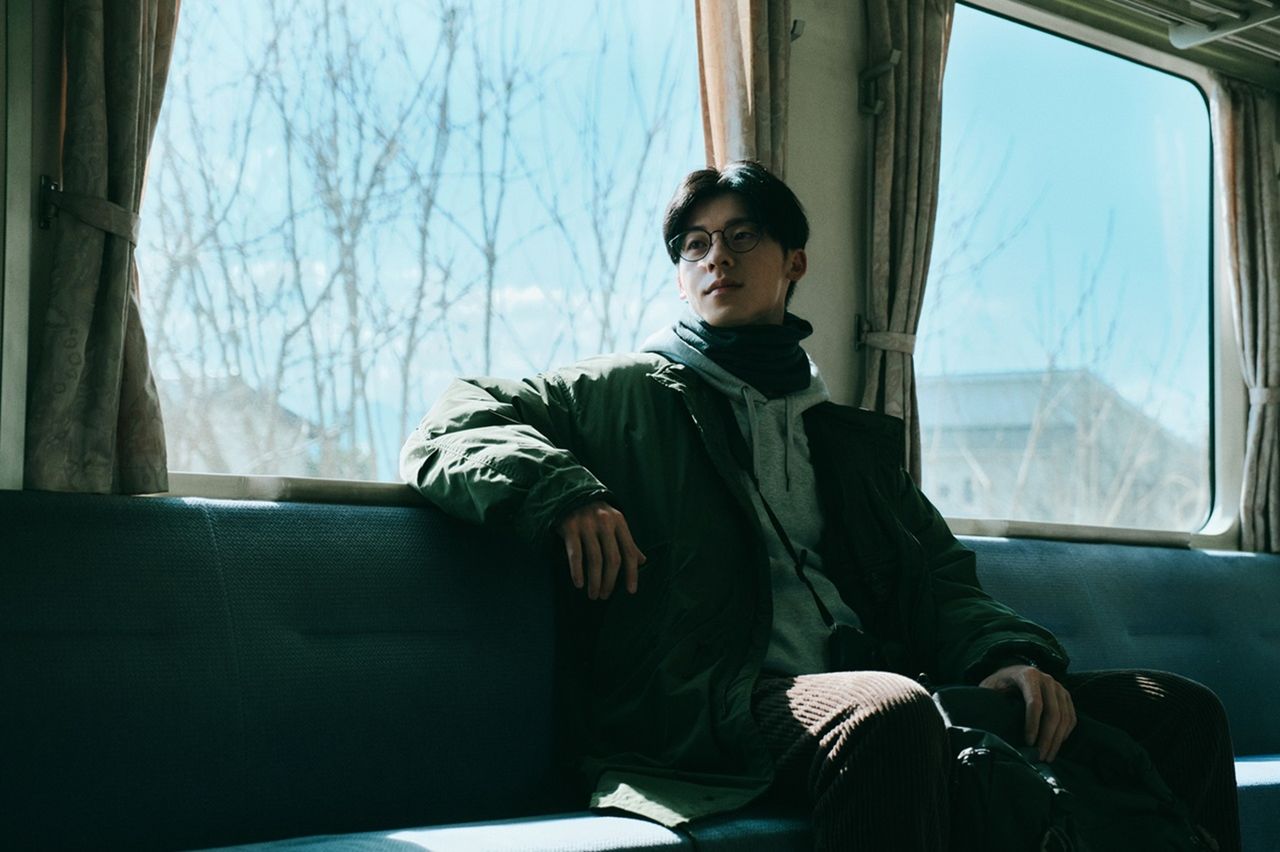
A Taiwanese man, Jimmy (Played by Greg Han Hsu), travels Japan by slow train. (© 2024 18×2 Beyond Youthful Days Film Partners)
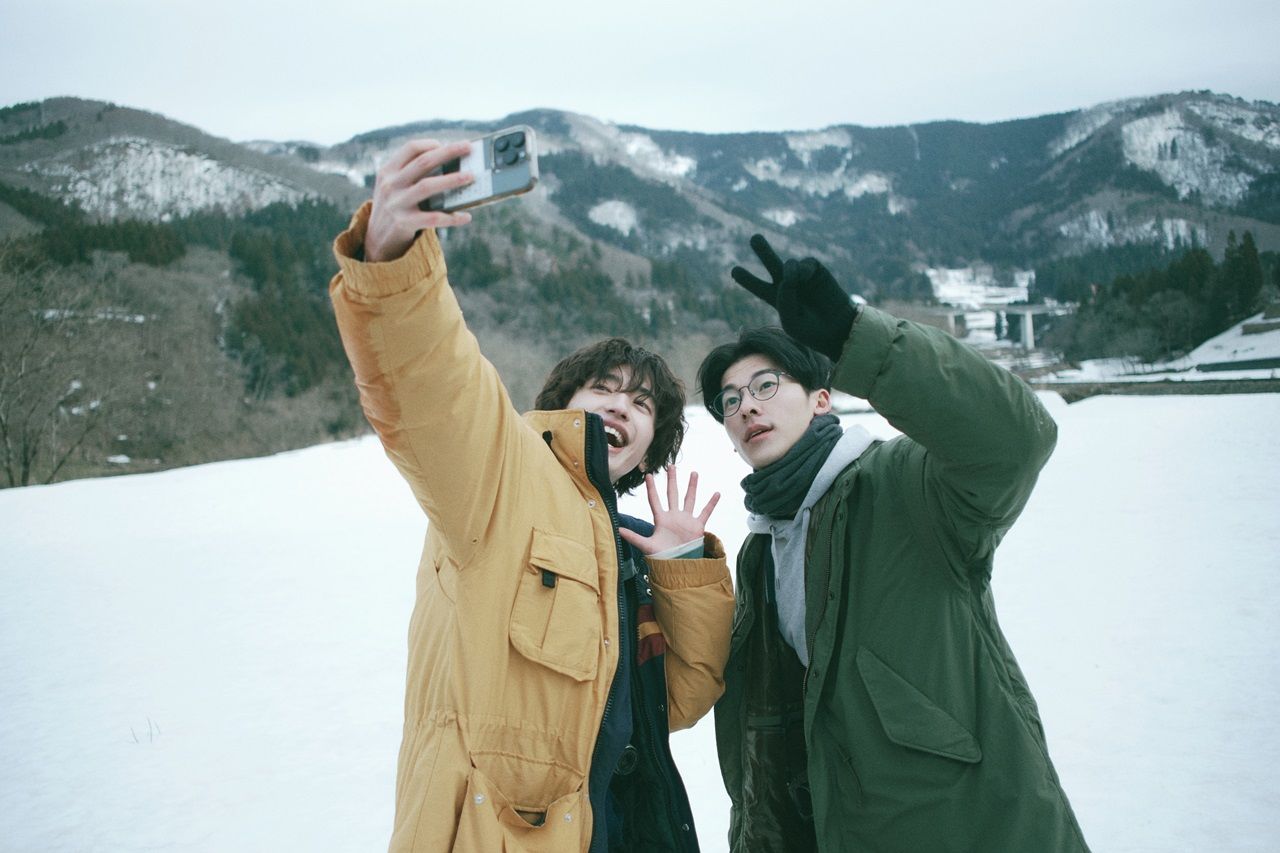
Jimmy meets Kōji (played by Michieda Shunsuke), and they hit it off immediately. (© 2024 18×2 Beyond Youthful Days Film Partners)
The film is based on travel essays posted on the internet by the Taiwanese game company founder Jimmy Lai in 2014. He traveled Japan using the Seishun 18 ticket and wrote about his trip, interwoven with reflections on his first romance with a girl named Ami. Producer Roger Huang spearheaded the film adaptation, and after four years of script development, Fujii Michihito eventually stepped in as director to finish it. During the film adaptation planning, Lai turned his essays into a novel published in Taiwan in February 2024.
The film follows the original work’s structure, interweaving scenes of Jimmy’s 2024 travels in Japan and his 2006 days with Ami in Taiwan. With his life at a crossroads, the parts showing Jimmy traveling Japan and reflecting on his youth all feature cold winter scenes, as if bringing his inner loneliness to the surface. In contrast, the Taiwan parts celebrate the richly sentimental memories of young love and are drenched in warm color, as if evoking the heat of Tainan itself.
Greg Han Hsu Shows Star Power
The film is driven by the power of lead actor Greg Han Hsu. He has a track record of hits in Taiwan, from the 2019–20 TV series Someday or One Day through films like 2019’s A Sun and 2023’s smash hit Marry My Dead Body. He shines here, portraying Jimmy at both 18 and 38 and pulling off expansive Japanese dialog.
Hsu was born in 1990, while Ami performer Kiyohara was born in 2002. That makes him 12 years older than her, but in the story, Ami is supposed to be four years his senior. And yet, his performance as 18-year-old Jimmy is so lively, and so filled with all the impact of a young man in the middle of his first love, that he becomes the very embodiment of cuteness. Hsu manages all the elements of a coming-of-age comedy with a delicacy that belies the true age difference. At the same time, he expresses Jimmy at 36 as a melancholy man of few words.
Hsu already has a reputation in Taiwan for being gifted in both serious and comedic roles, but this was his chance to show that off for Japanese audiences, as well. The happiness, worry, sadness, and sincerity he expresses in his performance give this film its texture.
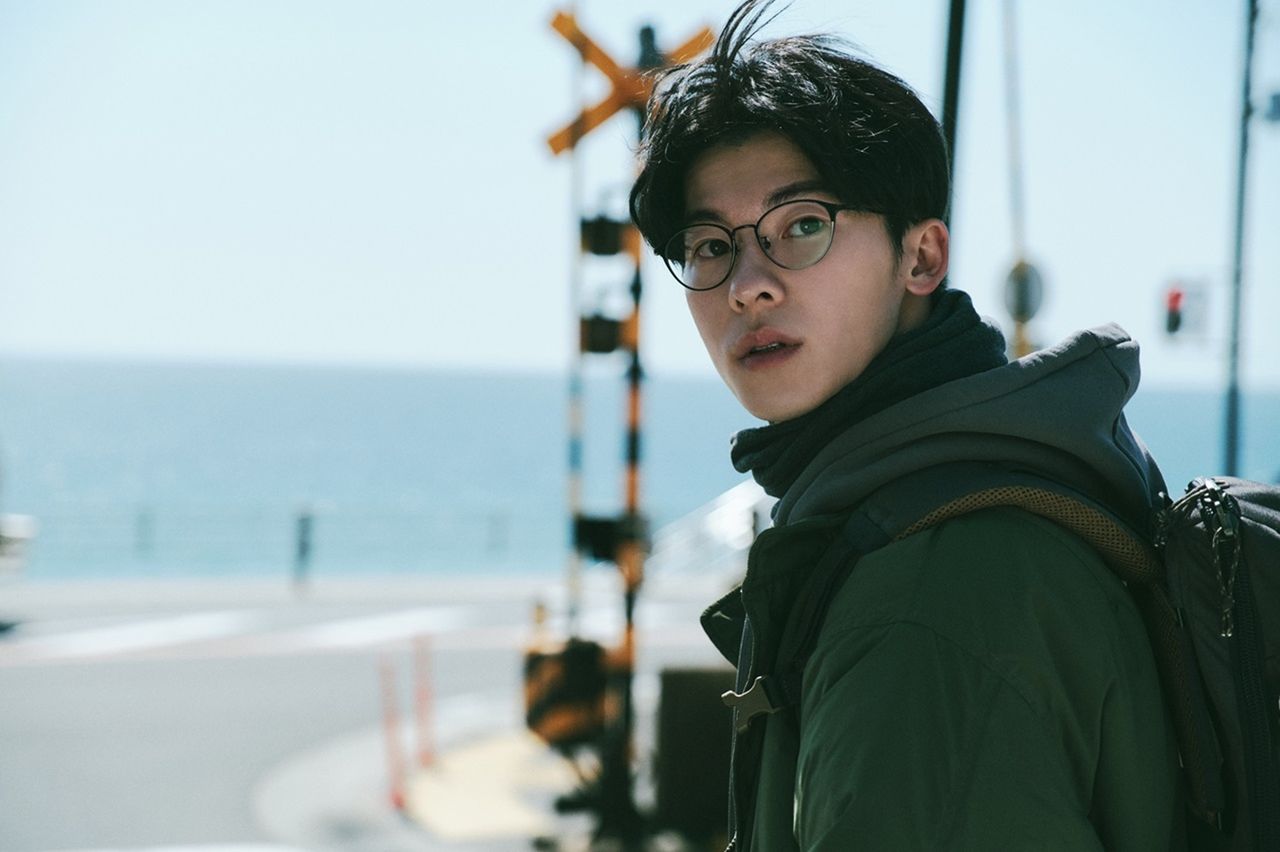
Jimmy at 36. A role this reserved is unusual for Hsu. (© 2024 18×2 Beyond Youthful Days Film Partners)
The performers behind the people Jimmy encounters along the way include popular Taiwanese actor Joseph Chang, who costarred with Hsu in the Netflix series Nowhere Man, as well as Japanese actors Michieda, Kuroki Haru, Matsushige Yutaka, Kuroki Hitomi, and more. The chemistry between Hsu and his Japanese costars in particular offers a unique sensation that surpasses expressions like “typical of the cinema of Japan/Taiwan.”
Kiyohara Kaya—who grasped a touch of Taiwan flavor herself with her lead role in One Second Ahead, One Second Behind, the Japanese remake of the Taiwanese production My Missing Valentine—plays opposite Hsu with a unique presence. Her interactions with up-and-coming star Buffy Chen—known from roles in 2020’s The Silent Forest and 2023 series Wave Makers—as a coworker at the karaoke shop are a treat, as well.
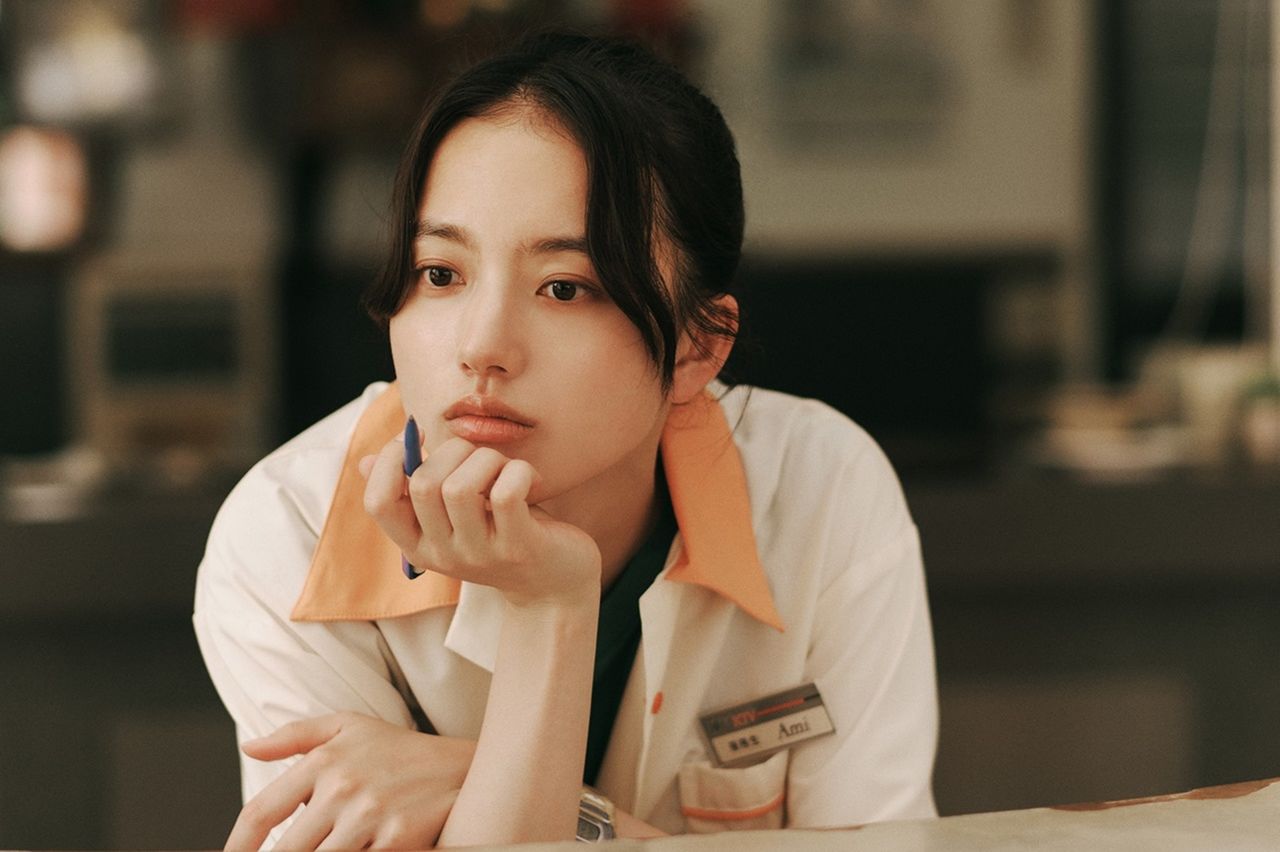
Kiyohara makes magic on the screen together with Hsu. (© 2024 18×2 Beyond Youthful Days Film Partners)
Between Japanese and Taiwan Cinema
This film moves between two extremes, with the Japanese part as a road movie and the Taiwanese part more of a tourist film. The latter fills the screen with scene after scene of typical Taiwanese culture, from bikes that run along train tracks, a lively night market filling the city streets with light, the shrine Jimmy and Ami visit, the Taiwanese tea that Jimmy and his father enjoy, and paper lanterns floating up into the sky. They’re sights that seem to be crying out, “Behold the very essence of Taiwanese culture!”
Of course, much of this is showing off Taiwan through Ami’s eyes, meaning it is by definition showing Taiwan and its culture from a Japanese perspective. Along with the nostalgic story of looking back on a first love, there are moments when the streets of Taiwan—often described as “nostalgic” themselves—seem on the verge of becoming mere devices in the service of nostalgia, but the cinematography of Imamura Keisuke deftly evades that by portraying the scenery in a dynamic way not often seen before.
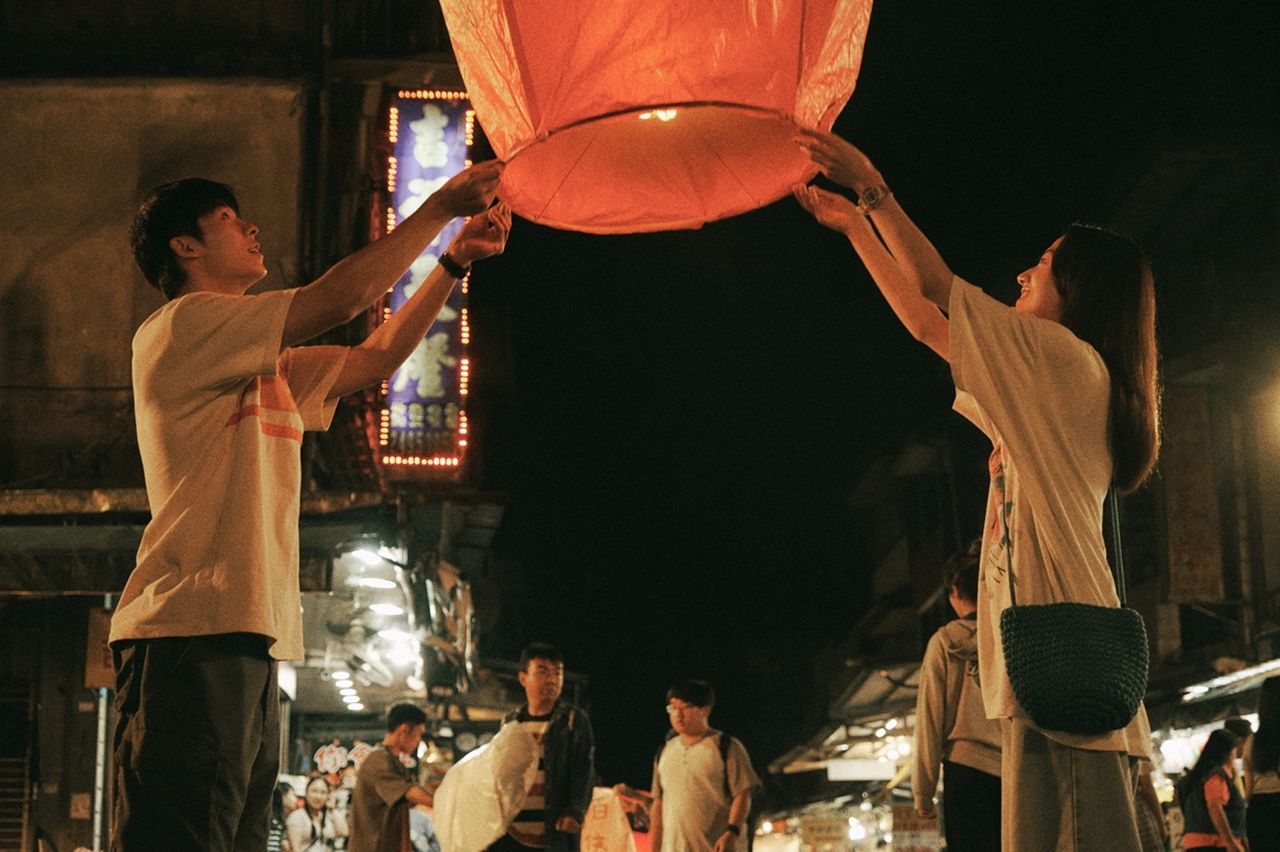
What wishes did Jimmy and Ami write on their lantern? (© 2024 18×2 Beyond Youthful Days Film Partners)
However, the Japan part does not become “Japan from Jimmy’s eyes.” The beauty of the snowy scenery he sees from the train windows comes close, but this section emphasizes the people he meets over the sights he sees. Even so, some of the Japanese culture most loved in Taiwan does show up. That includes the manga Slam Dunk, the railroad-based video game Momotarō Dentetsu, Iwai Shunji’s 1995 film Love Letter, and the band Mr. Children, who also provide the theme song. It is their presence often props up Jimmy’s story on the screen, rather than Japan itself.
In other words, this film brings together not only actors from Japan and Taiwan, but also the landscapes and cultures of both. This blurs the position of the filmmakers’ vantage point, and that flux is the likely reason behind this work’s impression of existing somewhere between Japanese and Taiwanese cinema.
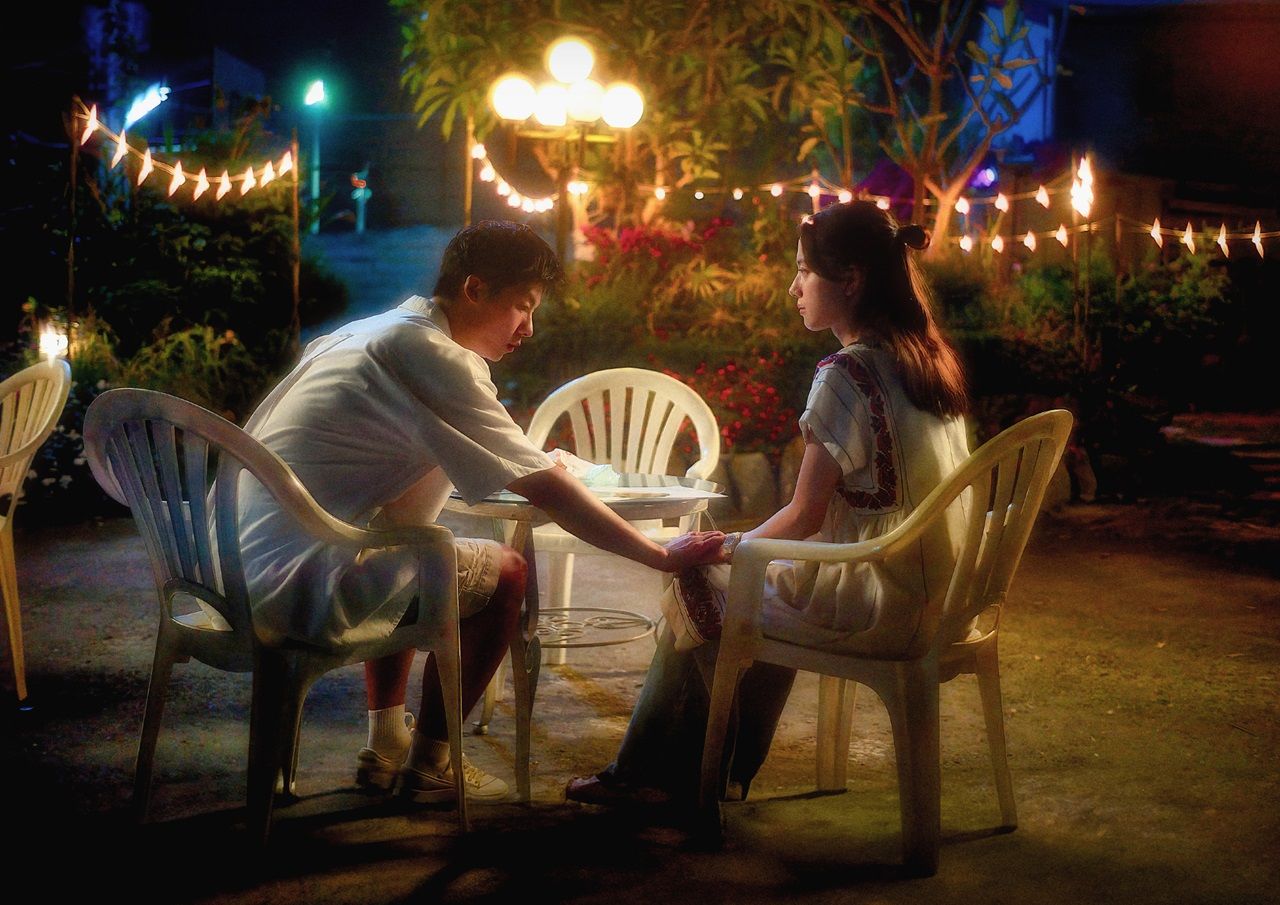
The fun and sweetness of a young love is the heart of the Taiwan sections. (© 2024 18×2 Beyond Youthful Days Film Partners)
Even as Ami is a take on the of “attractive older woman” trope you often see in Japan’s boy’s manga, her elusiveness recalls the female lead roles typical of Taiwanese cinema, including in the aforementioned My Missing Valentine. The elements of an adult man looking back on his first love and the respect given to Japanese culture also recall Director Giddens Ko’s huge 2011 Taiwan hit You Are the Apple of My Eye.
However, even with that multilayered nature, with the script moving between the modern age and 18 years ago, between Japan and Taiwan, it is not overly complicated. Indeed, the underlying structure is a simple, gentle one. In the second half, which I will refrain from touching too much on as it reveals the core of the story, it ratchets up the drama and shares themes that Fujii has addressed in past work. The developments are, in fact, based specifically on one particularly essay of Lai’s and are part of the reason that Fujii chose to make the film.
What is it that makes us feel something is “typical” of the cinema of Japan, or of Taiwan? Are introspective, sentimental love stories “Japanese,” while bright, passionate youth is “Taiwanese,” or is it the opposite? Whatever the answer is, in the end, it is the somehow clean, sober aftertaste that makes this film interesting. I offer my compliments to the diversity of style that allows this to truly be called “typical of a Japan-Taiwan Coproduction,” as well as to the performance of Hsu, who made it come alive.
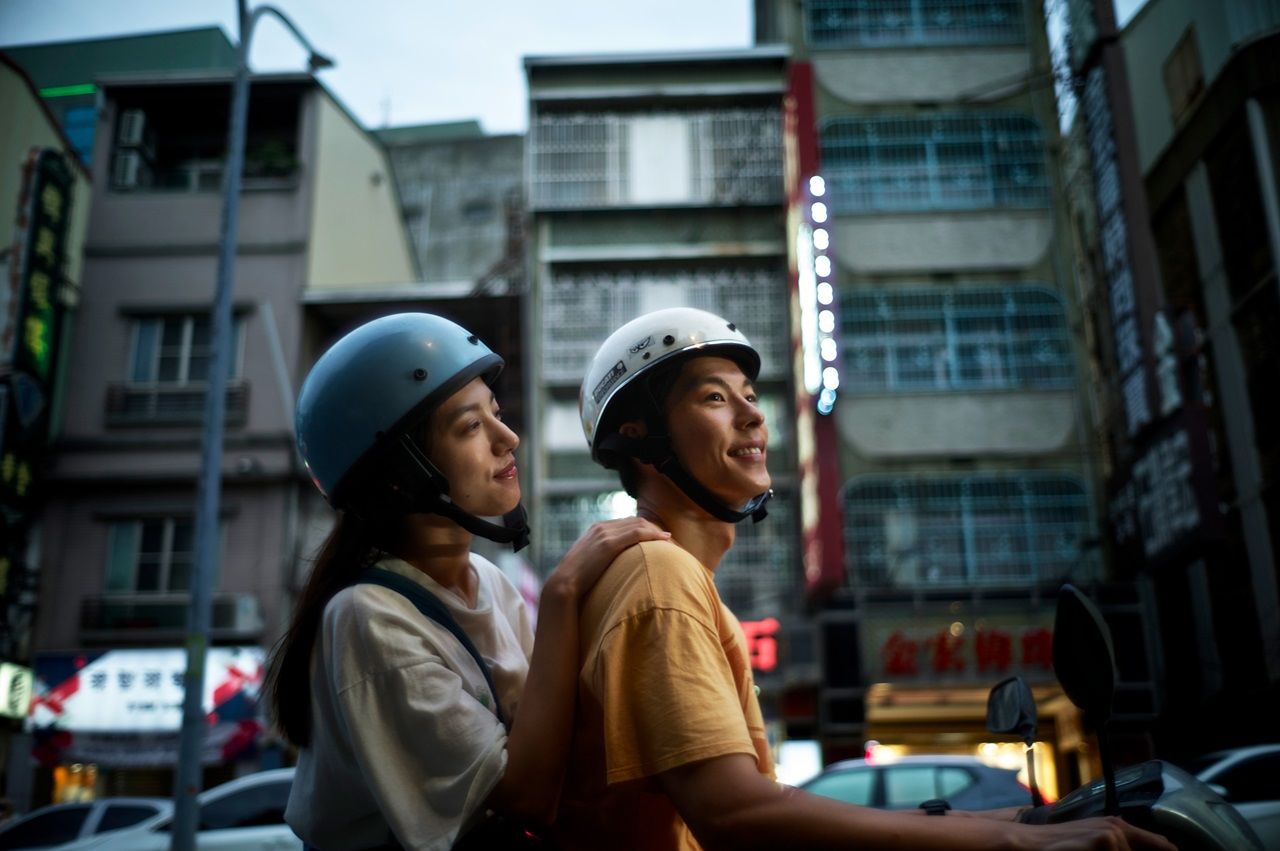
(© 2024 18×2 Beyond Youthful Days Film Partners)
Trailer (Japanese)
(Originally published in Japanese. Banner photo © 2024 18×2 Beyond Youthful Days Film Partners.)

